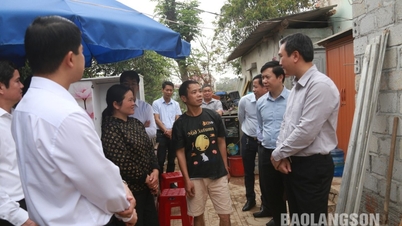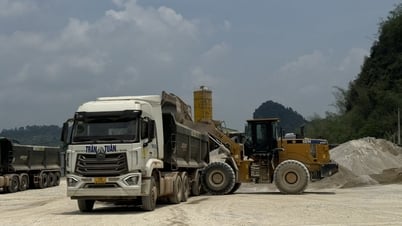On March 21, the Prime Minister issued Directive No. 7/CT-TTg on strengthening policy communication. Currently, in addition to traditional forms, policy communication via social networks is becoming a new trend in the digital age.

Therefore, proactively exploiting and utilizing the strengths of social networks will contribute to improving efficiency as well as creating great benefits in implementing policy communication tasks.
Reality has shown that if policy information is disseminated and popularized in a diverse and accessible way, it will help people easily grasp and apply it in practice, helping the Party and State's policies and guidelines quickly become effective in life.
Regarding this issue, in his closing speech at the National Conference on the implementation of laws and resolutions of the 6th session and the 5th extraordinary session of the 15th National Assembly, National Assembly Chairman Vuong Dinh Hue expressed his interest in and highly appreciated the role of social networks in the information and propaganda work on draft laws, as well as policies of the Party and State, and at the same time requested the Minister of Justice and the Chairman of the Law Committee to carefully study the phenomenon of social networks promoting the film "Dao, Pho and Piano" to apply to the dissemination and education of law.
Currently, the use of policy communication through social networks is a popular trend in the world because of its outstanding advantages. Not only the people but also many leaders in the world have quickly used social networks as an indispensable tool in management, social governance and policy communication. Vietnam has many advantages in this regard because the potential of our cyberspace communication ecosystem is huge.
As of 2023, Vietnam has 77.93 million social media users, accounting for 79.1% of the population. With a large platform that allows millions of people to access at the same time, information related to social policies can be transmitted to create a very strong effect, if we know how to make that information attractive and outstanding. Therefore, holding social media communication tools will help state management agencies quickly disseminate new policies to all classes of people, while easily listening to and recording feedback and interactions from the people to make timely adjustments.
Looking back at the Covid-19 pandemic outbreak, social networks have played a good role in policy communication, as well as updating information and guiding people in disease prevention. Currently, most of the government and organizations from the central to the grassroots levels have social networking sites that increasingly integrate many easy-to-use and easy-to-interact features, and have well-trained human resources. Through social networks, many state agencies have established information connection lines, disseminated policies quickly and effectively to the community, and encouraged people to accompany the government.
However, it is also necessary to frankly admit that in some localities, departments and sectors, the organization of social networking sites, especially those related to policy communication work, is still monotonous, poor, lacking creativity, and has not attracted the attention of the majority of people. Many new websites are just "created for the sake of it", lacking care, not regularly updated with new information, and the software is not user-friendly. Some organizations and units have not yet properly recognized the importance of social networks in policy communication, and have not yet taken advantage of the outstanding advantages of social networks in transmitting and storing information.
Referring to the power of social media in disseminating legal knowledge, also at the National Conference on implementing laws and resolutions of the 6th session and the 5th extraordinary session of the 15th National Assembly, National Assembly Chairman Vuong Dinh Hue gave an example: “There are TikTokers and bloggers who analyze Clause 4 of the Land Law, which defines what is a Vietnamese person abroad, a foreigner of Vietnamese origin...
Such a broadcast attracts hundreds of thousands of viewers. That is, when an influential individual mentions policies and laws on social networks, it can bring about a very large effect. Likewise, if a state organization's social network attracts a large number of visitors and has a creative way of communicating policies, the effect will be superior to traditional methods.
So, what is the solution to promote the usefulness of policy communication via social networks? I think, first of all, we must start with awareness. Social networks and their advantages have created a new "game" that requires management agencies to change their awareness. Obviously, in propagating the Party's guidelines and policies, the State's laws and policies to the people quickly and promptly, the role of social networks cannot be ignored.
Therefore, agencies, organizations, and local authorities need to take full advantage of the advantages of social networks, upgrade their information pages to be friendly, easy to access, easy to use, with vivid, rich, and attractive content. For example, it is necessary to proactively invite experts who are knowledgeable about policies and have influence on social networks to participate in analysis and comment directly on their personal pages, or organize online seminars with diverse formats to attract many participants.
Actively shift from one-way propaganda to multi-dimensional interaction, so that it is close and suitable for all classes of people. Continuously promote the role, strength and creativity of the whole community, so that people and the government can accompany, support and join hands to propagate new policies in a convincing manner.
Policy communication requires a systematic strategy, helping state management agencies proactively set out criteria for content and forms of propaganda that are appropriate and effective, avoiding negative opinions, which are a difficult-to-control downside on social networks. At the same time, it is necessary to be vigilant against the tricks of hostile and ill-intentioned individuals and organizations, who are ready to take advantage of loopholes in social networks to cut and paste information about policies and laws to sabotage the Party and the State.
The close connection between state agencies and people through social networks will promote the sense of responsibility of people in proactively speaking up to protect their rights, as well as the interests of the country against bad, toxic, and distorted information about policies. Building a strategy is also a way for investment management agencies to build appropriate, directional information highlights so that policy communication messages become prominent, become the main source of information at a time, and not be obscured, lost in the endless sea of information, or even disturbed on social networks.
To effectively communicate policies through social networks, all levels, sectors and units need to pay attention to training and improving the skills of experts and managers. At the same time, it is necessary to focus on investing in technology to create professionalism and convenience for communication activities, quickly and promptly bring information to people and increase the ability to interact with people.
It is necessary to build, supplement and perfect a synchronous system of mechanisms and policies, create a complete and transparent legal corridor, and ensure a healthy, humane and responsible social network environment. In that environment, managers and people can simultaneously access new policies, respond and make positive contributions to building a civilized and disciplined society.
Nowadays, social networks have become an important part of the lives of the majority of people, especially the youth. Taking advantage of the strengths of social networks in policy communication work is therefore becoming more and more important. This issue is also clearly stated in Directive No. 7/CT-TTg: “Application of modern technology in information and communication management to detect and forecast positive and negative information trends, beneficial and detrimental to the direction and administration work.
Research and deploy new policy communication models based on international experience for flexible and appropriate application to Vietnam's circumstances. Deeply understanding this will help managers and each citizen understand their role, join hands and share, and make practical contributions to the cause of innovation and national development, and fulfill the goals in the 10-year Socio-Economic Development Strategy 2021-2030 set by our Party.
Source




































































































Comment (0)